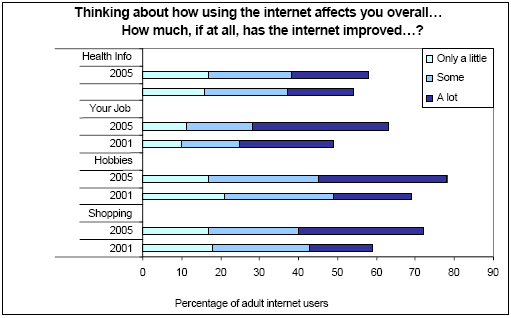Health Decisions 2006
Recent research from the Pew Internet & American Life Project shows that, as more and more Americans come online, so too do more Americans rely on the internet for important health information. In a March 2005 survey, 12% of online adults –representative of 17 million people–said the internet played a crucial or important role as they helped another person cope with a major illness. When the same question was asked in a January 2002 survey, nearly the same proportion (10%) said the net played a major role in such circumstances, but that represented only 11 million people. In addition, the March 2005 survey found the number of those who said the internet played a crucial or important role as they themselves coped with a major illness reached 7 million while a December 2005 survey found that one in five (20%) online Americans said the internet has greatly improved the way they get information about health care.1
Still, while the internet’s role as a health care resource has expanded along with the number of internet users, the web continues to play a substantially larger role in many of life’s other pursuits—such as shopping and hobbies. For example:
- The share of online Americans who said the internet has greatly improved their ability to shop doubled—from 16% in March 2001 to 32% in December 2005.
- The share of online Americans who said the internet has greatly improved the way they pursue hobbies and interests climbed from 20% in March 2001 to 33%.
- The share of online Americans who said the internet has greatly improved their ability to do their job rose to 35%, up from 24% in March 2001.
So what’s going on here? Does the internet matter less for health than it does for finding that one-of-a-kind iPod case you’ve been hunting for?
The short answer is: it depends on your personal situation. Many Americans are deepening their connections to the internet, whether for entertainment or to help a loved one through a crisis. And while the audience for the latest DVD may be larger than the audience for clinical trial information, the impact on someone’s life in the latter case may be dramatically different in scale.

Source: For 2005 data, Pew Internet & American Life Project November-December 2005 Tracking Survey, n=1,931 adult internet users, 18 and older. Margin of error is plus or minus 2 percentage points for results based on internet users. For 2001 data, Pew Internet & American Life Project March 2001 Longitudinal Callback Survey, n=862 adult internet users, 18 and older. Margin of error is plus or minus 4 percentage points for results based on internet users.
Some measure of the importance of internet access in decisions affecting health can be gleaned from additional questions asked in the December survey, released here for the first time, which focused on significant life decisions or events. In that survey we asked respondents first whether they had helped someone deal with a major illness or health condition within the past two years and, if they had, whether the internet played a crucial role, an important one, a minor role, or no role at all in this event. We then asked “e-caregivers” (those who said they had found the internet to be crucial or important during a loved one’s recent health crisis) about the internet’s specific role during that time. We found the following:
- 36% of e-caregivers said the internet helped them find advice or support from other people.
- 34% of e-caregivers said the internet helped them find professional or expert services.
- 26% of e-caregivers said the internet helped them find information or compare options.
Just 6% of e-caregivers reported getting from the internet either bad information or advice that made their experience more difficult. By comparison, 91% of e-caregivers said that was not a problem for them.
Moreover, the internet often played a major role for e-caregivers. When asked about all of the different sources of information they used, 58% of e-caregivers said the most important source was something they found on the internet. Only 38% said the most important source was one they found offline.
Since these key sources can be quite varied, we asked e-caregivers to name that one essential source. Here is a sample of their answers:
- Health facilities’ websites
- Doctors/physicians
- Medical advice and information online
- WebMD.com
- [Finding out] exactly what my condition was
- My medical background and self-knowledge
- Journals through the National Institutes of Health
- Head of a cancer support group
- Went online to get information about medications that could not be mixed together
- [Finding out] about medical condition treatment options
- Information I received from different breast cancer sites; information the women had posted about their experiences
- Support group; families [dealing with] a particular disease
- Medweb to find out what medicines were, what the side effects were, and the dosage that was sufficient
- Researching the surgical process that was going to be taken: heart bypass and valve replacement
- Found out [how to] live with disease
- Arthritis doctors and research on arthritis
- American Cancer Society
- Looking for elderly care options
- Lymphoma Society
- Hospice
This wide range of topics and sources illustrates how powerful a tool the internet can now be for those seeking needed information relating to health and health care. The range of sources extend from in-depth research on medical diagnosis and treatment, expert opinions on specific conditions, access to communities of like-minded individuals, and advice on treatment and adjustment options. And while many will not need access to that information at any given time, there is clearly a growing population that considers the internet to be a crucial resource.




